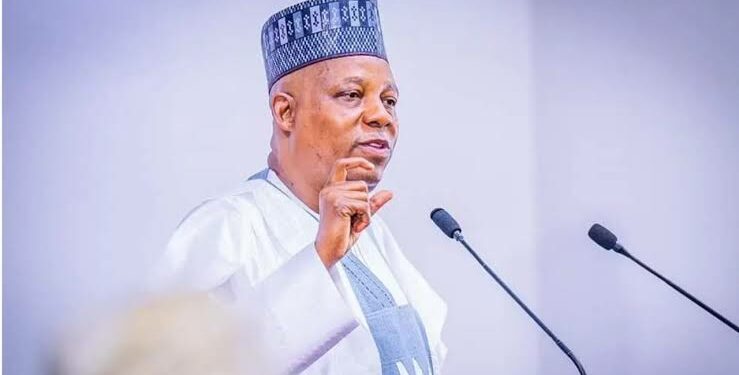Headlines
Shettima urges African leaders at WEF to boost their nation’s GDP

During the African Economy of Scale Plenary at the World Economic Forum in Davos, Nigeria’s Vice President, Kashim Shettima, emphasized the need for African leaders to work towards increasing the continent’s total GDP of $3.1 trillion, which currently represents less than 3% of the global GDP. Shettima expressed concern over the fact that African trade still only accounts for 3% of world trade and stressed the importance of reversing these figures.
He acknowledged that African economies are primarily reliant on the global economy, with a heavy focus on the export of raw materials and agricultural products.
Shettima highlighted the urgent need to add value to these primary products and move towards secondary and tertiary product manufacturing. He emphasized that Africa is considered a growth economy in need of investments and infrastructure, and urged African leaders to unite and form a stronger, more influential unit to enhance their negotiating abilities.
He emphasized the importance of running faster and purposefully to catch up with the rest of the world in eradicating poverty on the continent and showcasing Africa’s potential as a significant contributor to global productivity.
He stressed the need for increased productivity in African nations to improve living standards, including the provision of food, affordable housing, a thriving textile industry, energy, social services, and efficient transportation systems. He highlighted the benefits of pooling resources together as African nations to reduce production costs and achieve higher levels of efficiency in both the public and private sectors.
The Vice President acknowledged the projected boost to Africa’s GDP through the African trade agreement and emphasized the urgency of creating an African economy of scale. He praised the concept of economy of scale for Africa, considering the continent’s potential for development and numerous opportunities.
He viewed the challenges facing Africa as opportunities for engagement, productivity, and profitability, while also acknowledging the significant infrastructure deficit in the trillions of US Dollars.
He emphasized the need for essential infrastructure such as housing units, schools, community centers, roads, rail networks, airports, water transport, technology enablement, and major interventions in various sectors.
Shettima expressed his appreciation for the contributions of African youth in revitalizing the continent, highlighting their success in establishing prominent technology-driven private-sector enterprises, some of which have achieved unicorn status with a capitalization exceeding $1 billion. He emphasized that the Pan-African Payments and Settlement System (PAPSS) is a testament to the technological expertise of young professionals, who operate within a larger organizational framework.
Additionally, he noted the significant impact of African youth in the creative and arts sectors, both within and beyond the continent. Furthermore, there has been a notable drive in the outsourcing industry for African youth to demonstrate their relevance by pursuing remote work opportunities worldwide, leading to a redefinition of the landscape.
